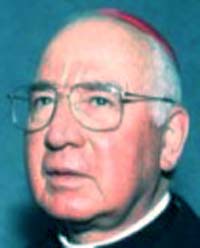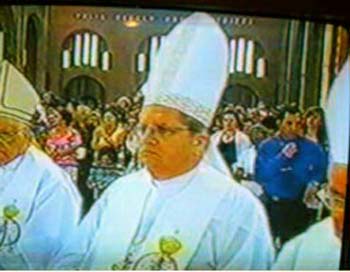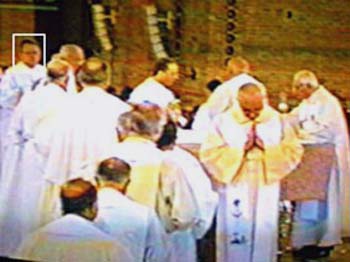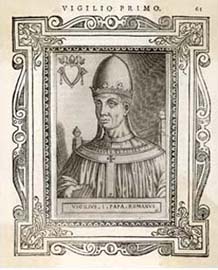 |
Traditionalist Issues
Rifan, Quo Primum and the New Mass
Atila Sinke Guimarães
Some few days ago, I received from a TIA reader in Brazil the Portuguese text of the most recent document by Bishop Fernando Rifan, released on April 2, 2007. The document – 48 pages on regular 8 ½” x 11” paper – is still timely, as we will see. It is called an apostolic orientation, a kind of pastoral letter for a Bishop without a territorial diocese. I am placing the Portuguese original here to silence the constant bad-faith allegations of poor translations or out-of-context quotes. Anyone who wants can check it directly or have someone translate it for him.
I intend to reproduce parts of the documents and comment on them in two installments for a twofold purpose: First, to inform American traditionalists who do not have access to Portuguese texts; and second, for the benefit of Brazilian traditionalists who may need some small assistance to see how deficient this apostolic orientation is.
The document addresses the traditionalists under Bishop Rifan’s authority, who are located all over Brazil, but mostly in the County of Campos, in the State of Rio. It aims to stop any opposition to the Bishop’s "new traditionalist look," whereby he, as well as his priests, accept and celebrate the New Mass and promote Vatican II.
To this end, he is obliged to clearly spell out his position on Quo primum, the New Mass and Vatican II. This is what I will focus on. The document unmistakably shows that the traditionalist Fr. Rifan of yesterday has completely changed his hat.
1. Quo primum
Since I will be quoting Bishop Rifan – who quotes authors who in their turn quote other documents – for the sake of clarity and the comfort of my readers, the texts of his apostolic orientation will be in maroon, while my comments will remain in black. The translation from Portuguese is mine.
The first point I want to spotlight is his attack on the perennial character of the Apostolic Constitution Quo primum by St. Pius V. These are his words:
Regarding the traditional Roman Liturgy called that of St. Pius V and established by the Bull Quo primum tempore, which some think can never be modified by a later Pope, we quote an official response from the Congregation of Divine Worship (June 11, 1999):

Card. Medina Estevez covers for
Paul VI's violation of Quo primum |
“Can a Pope establish a rite forever? The answer is, no. Regarding the power of the Church on administering the sacrament of the Eucharist, the Council of Trent clearly declares: ‘In the ministry of sacraments, the Church always has the power to regulate and change – except in their substance – those things she considers to be better for the benefit of the faithful or for the veneration of the sacraments themselves, according to the variety of things, times and places’ (DS 1728). From a canonical perspective, one should say that when a Pope writes perpetuo concedimus [we order forever], one should suppose that this implies ‘until another way is ordered.’ It is proper to the supreme authority of the Roman Pontiff not to be limited in merely ecclesiastical laws, even those of his predecessors. He is only bound by immutable divine law and natural law, as well as by the constitution of the Church” (p. 9).
Regarding this text by the Congregation of Divine Worship issued during the term when the Chilean Cardinal Julio Medina Estevez was its prefect, I would like to make these observations:
- The argument attributes to St. Pius V the very opposite of his express intention to maintain the one same text of the Mass forever (1). Therefore, it adulterates the Pontiff’s purpose, which reveals dishonesty.
- The opinion of the Congregation leaves out the fact that for 400 years Popes considered Quo primum an immutable decision. Such omission is meant to lessen the gravity of the changes made by Paul VI, which reveals partiality.
- The reason given for why one Pope can always reform the decision of previous Popes is not applicable to this case. It only applies to those reforms that do not change the substance of the sacraments and the Mass. However, Paul VI changed the substance of the Mass when he changed the formulas of the Canon from Latin to the vernacular, allowed different Canons to be said,
hid the sacrificial character of the Mass, gave a different meaning to the Eucharist, and presented a Protestant interpretation to the whole of the Mass in opposition to what had been established by St. Pius V. Therefore, Paul VI frontally defied the sentence of St. Pius V, going far beyond the limits of his authority [for more on this topic, click here]. Hence the reason alleged by the Congregation of the Worship when applied to the New Mass is erroneous.
- Card. Medina Estevez, as a subordinate of John Paul II, was not completely free to say that Quo primum was still in force, since this would imply opposing the New Mass that had already been approved by John Paul II and by Paul VI. He was working under an implicit threat of losing his job and ending his career.
- Furthermore, Medina Estevez was a partisan of the New Mass and, therefore, his open approval of it did not allow him the needed impartiality to reflect the mind of the Catholic Church. Rather, his opinion reflects only the mind of the progressivist current.
- For these reasons the decision of the Congregation for the Divine Worship is not decisive and does not bind any Catholic to obey it.
As a consequence, the argument of Bishop Rifan is also faulty.
Note 1: The intention of St. Pius V, when he issued his Bull or Apostolic Constitution Quo primum, was quite clear as a decision that should remain forever in the Church, especially since it is followed by an anathema of anyone who would change it. The final words of the document follow:
“We direct that printed copies of [this present Apostolic Constitution] … shall possess the same indubitable validity everywhere and in every country wherein Our present text will be displayed. Accordingly, no one whosoever is permitted to violate or imprudently contravene this notice of Our permission, statute, ordinance, command, direction, grant, indult, declaration, will, decree and prohibition. Should any person venture to do so, let him understand that he will incur the wrath of Almighty God and of the Blessed Apostles Peter and Paul.”
For the full text of the document both in English and Latin, click here.
2. New Mass

On September 8, 2004, Bishop Rifan concelebrates with other Brazilian Bishops at the Basilica of Our Lady Aparecida. Below in the square, participating in the Communion of the concelebrants
 |
Then, Bishop Rifan goes on to promote the New Mass. He says:
Adhesion to the traditional liturgy can never be made in the spirit of contesting the ecclesiastical authority or breaking communion. Adhesion to the traditional liturgy must be conserved without sinning against the sound doctrine of the Magisterium and without ever offending ecclesial communion.
As I wrote in my first pastoral message on January 5, 2003: “We conserve Tradition and the traditional Liturgy in union with the Hierarchy and the Church’s living Magisterium, and not in opposition to them. Liturgical diversity can be a source for enrichment, but it can also raise tensions, reciprocal misunderstandings and even schisms. In this field, it is clear that diversity should not harm unity. This unity cannot be expressed except by fidelity to the common faith … and to hierarchical communion” (p. 12).
He gives the examples of Cardinals Ratzinger, Antonelli and Gagnon, who expressed some criticism about the way the liturgical reform was applied but “remained within the boundaries of Catholic doctrine,” and maintained their “respect for the Magisterium of the Church.” Then Bishop Rifan continues:
These limits prevent us, for example, from affirming that the Novus Ordo Missae, the Mass promulgated by the Holy Father Paul VI, is heretical or non-Catholic. Its promulgation is the guarantee against any doctrinal irregularity that could have been introduced in its making, even though it can be improved in its liturgical expression. It is its official promulgation, and not the way it was written, that makes it a document of the Magisterium of the Church (ibid).

Pope Vigilius supported the heresy of monophysism |
So, according to Rifan, the very fact of a document being promulgated by a Pope is the guarantee of its orthodoxy. This affirmation seems to me quite original. According to this general rule, the official document signed by Pope Liberius in 357 professing a semi-Arian faith would be orthodox. Also the letters Postquam nobis and Magnum pondus, signed by Pope Zozimus in 417 in defense of Pelagius, and against Sts. Augustine and Aurelius, should be consider orthodox. The official adhesion of Pope Vigilius to the heresy of monophysism would also be orthodox. The letters by Pope Honorius praising the heresies of monoenergism and monothelism would be a part of the Magisterium of the Church as well. The same Honorius sent a document to the Spanish Bishops ordering then not to attack the errors of the Jewish religion. This would also be orthodox, according to Bishop Rifan…
He certainly should be more careful with his generalizations if he wants to be taken seriously.
The Prelate continues his apology for the New Mass:
No one can deny the fact that today the rite of Paul VI is the official Rite of the Latin Church, celebrated by the Pope and the whole Catholic Episcopate. No one can be Catholic and maintain an attitude refusing communion with the Pope and the Catholic Episcopate. Indeed, the Church defines as schismatic one who refuses to submit to the Roman Pontiff or be in communion with the other members of the Church subject to him (canon 751). Now then, to continuously and explicitly refuse to participate in any Mass according to the rite celebrated by the Pope and all the Bishops of the Church because he judges that this rite in itself is incompatible with the Faith or sinful, represents a formal rejection of communion with the Pope and the Catholic Episcopate (pp. 12-13).
Here we have a condemnation of those Catholics who resist the progressivist orientation of today’s Vatican. They would be wrong by the simple fact of not agreeing with the present day Popes and the almost totality of the Episcopate. They would be automatically schismatic. This is not a conclusive argument.
First, because we traditionalists are not resisting the Conciliar Popes and Episcopate because they represent the Church, but precisely because they oppose and are heading toward destroying all the past Tradition and Magisterium of the Church. This is the case not only regarding the New Mass, but with respect to the entire post-conciliar orientation of the recent Popes, as we extensively demonstrated in our Declaration of Resistance (2).
Second, such attitude of resistance toward a Pope is taught in the Scriptures through the example of St. Paul resisting St. Peter (Gal 2:11), and was advised by great Saints and Doctors for the faithful to take toward a Pope who attempts to destroy the Tradition of the Church, as we also proved in our resistance statement (3).
Third, if it were true that the faithful who resist the Popes who adhere to errors were wrong to do so, then those Catholics of the fourth century who refused to adhere to the semi-Arianism approved by Pope Liberius along with almost the totality of Bishops would also be schismatic. But, on the contrary, those Catholics count among the most glorious faithful of History because they had the merit of preserving the Catholic Faith while resisting the Pope and all the Hierarchy who had apostatized.
Again, Rifan missed – or conveniently forgot – his classes on Church History.
Note 2. Atila Guimaraes-Michael Matt-John Vennari-Marian Horvat, We Resist You to the Face, Los Angeles: TIA, 2000, pp. 11-42.
Note 3. Ibid, pp. 56-57.
He goes on to condemn whoever disagrees with the Novus Ordo Mass:
The fact that in our Apostolic Administration we have the rite of St. Pius V as an exclusive rite by the concession of the Holy See does not mean that we should avoid participating in the Mass in its present day form, considering it in practice as invalid or illicit, that is, sinful.
For whoever, either in practice or in theory, would consider the New Mass in itself as invalid, sacrilegious, heterodox or non-Catholic, sinful, and therefore, illegitimate, would have to reach the normal theological consequences of this position, and apply them to the Pope and all the Episcopate throughout the world, that is, to the whole teaching Church. That is to say, he would have to sustain that the Church officially promulgated an illegitimate and sinful worship, conserved it for decades, and offers it every day to God – a proposition condemned by the Church – and therefore sustain that the gates of Hell had prevailed against her, which would be a heresy. Or he would adopt the sectarian principle that only he and those who think like him are the Church, and that outside of themselves there is no salvation, which would be another heresy. These positions cannot be accepted by a Catholic either in theory or in practice (p. 13).

St. Hilary of Poitiers, above, kept records of the official adhesion of Pope Liberius to Arianism |
This reasoning seems to me a little melodramatic. Let me analyze the facts. We traditionalist Catholics consider that the New Mass has a flavor of heresy – which we have extensively proved elsewhere (4). For this reason we say that it is an illegitimate Mass, even if it be valid. We consider that Paul VI was the one who invited Protestants to help establish this New Mass. We consider that after the New Mass was released, the Bishops accepted it either because of their ideological adhesion to Progressivism or from fear of losing their careers. Almost everybody knows that, and Rifan, when he was a priest, was in tune with these very same things.
Now that he is wearing a new hat, or rather a new miter, he pretends that our position is equivalent to saying that the gates of Hell had prevailed against the Church. To perform this sleight of hand, he juggles and mixes two different things: One is the reality we have before our eyes; another is the interpretation of the mysterious words of Our Lord. We should not close the eyes to the palpable reality to avoid contradicting words whose precise meaning or application we cannot know for sure.
Our position regarding these words is simple. If Our Lord, who knew the future, said that the gates of Hell will not prevail against the Church, it is because they will not do so. The topic is closed to discussion. Therefore, the present day situation of the Church, as bad as it may be, is not yet the total victory of Hell. If we do not understand how the present situation lies outside that prevision, this does not change anything. We realize that our small human intelligences cannot comprehend those words that came from the infinite intelligence of the Word Incarnate. There is only an apparent contradiction, not a real one. Bishop Rifan pretends that one should deny seeing the crisis in the Church to avoid contradicting those words. Or he at least wants to raise some scruples in the faithful of his audience who do not agree with him.
Next, he attacks us traditionalists as “sectarian” because “outside themselves there is no salvation.” I don’t know what facts he based himself on to come to this conclusion. I know many traditionalist Catholics – myself included – who sincerely pray at the end of each decade of their daily Rosary the Fatima prayer: “Bring all souls to Heaven, especially those in most need of Thy mercy.” This means that we do not restrict salvation to those who belong to this or that sector inside the Catholic Church. I have never known any traditionalist group that seriously claims that “outside of themselves there is no salvation.”
It looks like another thespian posture of Bishop Rifan, without intellectual merit.
Note 4. A.S. Guimarães, In the Murky Waters of Vatican II, Metairie, LA: MAETA, 1997, pp. 217-239. On the general adaptation of the Conciliar Church to Protestantism, see by the same author, Quo Vadis Petre? Los Angeles: TIA, 1999, pp. 17-26; Will He Find Faith? Los Angeles: TIA, 2007, pp. 226, 251, 265, 334.
On this website see Fr. Stephen Sommerville, Reasons for Resistance and Disobedience, The New Mass Favors Protestantism, Desacrificing the Mass, Part I, Desacrificing... Part II; Marian Horvat, Ph.D., The New Mass: A Flavor of Protestantism
At the end of his argument on the Mass, His Excellency becomes solemn and imperative. He commands that no one should ever criticize him or any of his priests who celebrate or concelebrate the New Mass. These are his words:
Let it be quite clear, therefore, in view of all we are teaching here, that even though we have the traditional Roman rite for the Mass as our proper rite in our Apostolic Administration, the possible participation of some of the faithful, or the concelebration of some of our priests or their Bishop, in a Mass in the rite officially promulgated by the Hierarchy of the Church, established as legitimate and adopted by the Church, as is the Mass celebrated in the present day Roman rite, cannot be considered as something bad or deserving of any criticism. Nor can this mean that we lost our liturgical identity, but rather it is a demonstration of our communion with the other Bishops, priests and faithful, despite the difference of rites (ibid.).
The statement is clear enough to explain what is going on: Bishop Rifan celebrates and concelebrates the New Mass, as do his priests. He allows (invites?) his flock to assist at it, and condemns anyone who says anything against it.
May my readers take a good lesson from this example. Yesterday the man was considered one of the leaders of the traditionalist movement; today, for the price of a miter, he completely sold out his ideals.
I hope to analyze his defense of Vatican II and more of his attacks on traditionalists in my next installment.

Posted September 26, 2007

Related Topics of Interest
 Bishop Rifan's Bretrayal Bishop Rifan's Bretrayal
 The New Mass: A Flavor of Protestantism The New Mass: A Flavor of Protestantism
 The Six Marks of the Novus Ordo Mass The Six Marks of the Novus Ordo Mass
 Reasons for Resistance and Disobedience Reasons for Resistance and Disobedience
 Lifting the Ban on the Tridentine Mass Lifting the Ban on the Tridentine Mass
 Desacrificing the Mass, Part I Desacrificing the Mass, Part I
 Desacrificing... Part II Desacrificing... Part II
 Quo Primum vs Novus Ordo Mass Quo Primum vs Novus Ordo Mass
 The Motu Proprio, after the Emotions The Motu Proprio, after the Emotions
 The Missal Crisis of '62 The Missal Crisis of '62

Related Works of Interest
|
Traditionalism | Hot Topics | Home | Books | CDs | Search | Contact Us | Donate

© 2002- Tradition in Action, Inc. All Rights
Reserved
|
 |
|